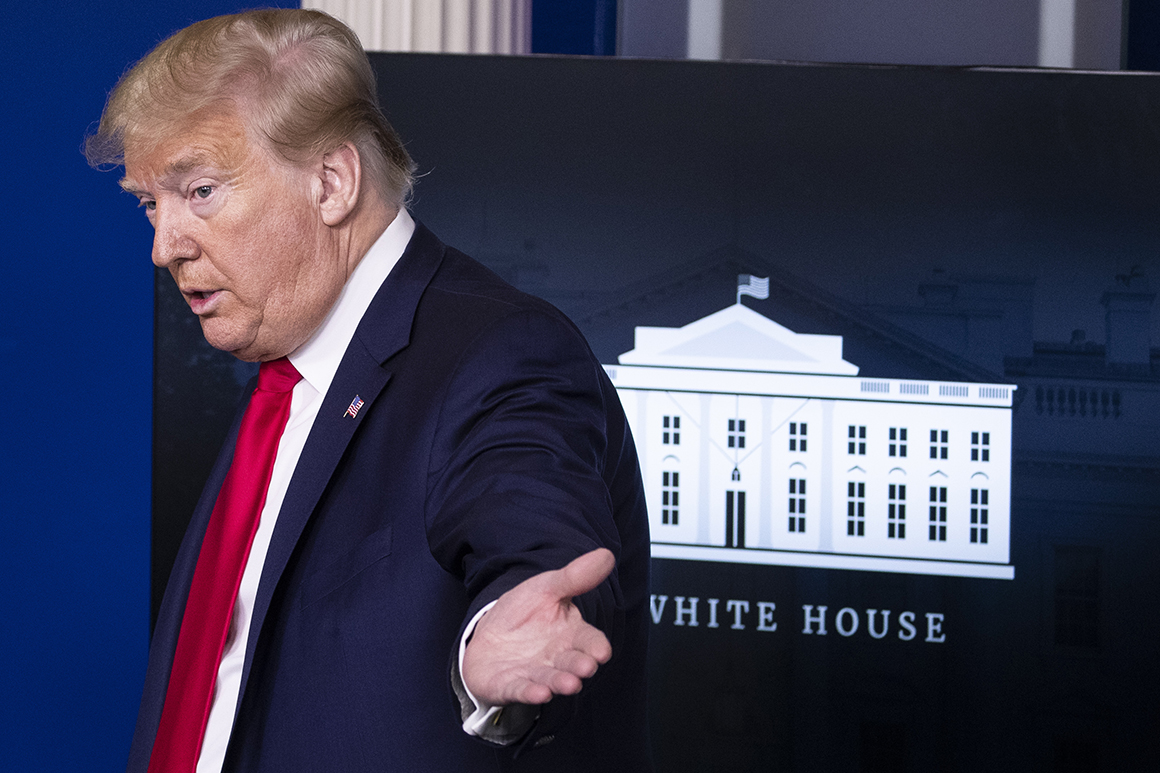
Some dismissed Trump’s rhetoric as election-year bluster not tethered to reality.
“President Trump’s statement on its face sounds more like political grandstanding than any actual enforcement of laws protecting religious freedom,” said Anthony Romero of the American Civil Liberties Union. “The states are accorded great deference and, in fact, the governors are the ones who are in the saddle on most of these judgment calls, notwithstanding the president’s thoughts and desires.”
As is often the case, Trump was long on bravado and short on explanation for how he planned to force his views on state leaders who declined to go along.
“Allow these very important, essential places of faith to open right now for this weekend. If they don’t do it, I will override the governors,” he insisted, before departing as reporters clamored for answers about the purported federal mandate.
Even his Harvard Law-trained press secretary, Kayleigh McEnany, struggled to explain about how the president would implement such an order, dismissing questions about the idea as “hypothetical” and lashing out at reporters for their supposed lack of faith.
Despite the lack of detail, the president’s blunt rhetoric put a new spotlight on the federal government’s most prominent effort to try to police state and local stay-at-home orders: a drive announced last month by Attorney General William Barr to pursue those regulations for potential violations of religious liberty, as well as other infringements on the rights of Americans.
So far, Trump’s promise to come to the rescue of beleaguered congregations has translated into only modest action. The Justice Department has yet to file a lawsuit on behalf of any church, organization or individual over the impact of state or local lockdown orders. Before Friday, its only court action was submitting what amounted to friend-of-the-court briefs in just two pandemic-related suits involving churches: one against a small Mississippi city and another against Virginia Gov. Ralph Northam.
The claims the federal government has made in the litigation have also been modest. Justice Department lawyers did not advance any argument on par with Trump’s broad assertion Friday that houses of worship are universally essential. Instead, DOJ attorneys have made the narrower argument that some churches are being subject to an unfair double-standard, especially when compared to businesses deemed essential and allowed to remain open, like liquor stores.
A top federal prosecutor said Friday that tallying up the number of Justice Department court filings doesn’t take account of how DOJ lawyers have prompted revision of some onerous local policies simply by reaching out to mayors and local officials.
“There may have been few lawsuits filed, but there have been a lot of back-channel, government-to-government calls made,” Zachary Terwilliger, the U.S. Attorney based in Alexandria, Va., told POLITICO. “Folks have decided to stand down once they realize we’re serious and this is not just rhetoric.”
Terwillinger welcomed Trump’s statements Friday and said the idea that churches are essential has a compelling, common-sense logic to it.
“If we’re in a situation where we’ve got Wal-Mart open with social distancing, why not church? This is essential for some people…. This is as essential as a liquor store, as essential as a tattoo parlor,” the prosecutor and former senior Justice Department official said.
Critics said Trump’s comments may not have been tied to any federal action, but rather to encourage churchgoers and ministers to defy state officials, precipitating on-the-ground conflicts and bad publicity that governors would likely avoid by softening their virus-related activity bans.
Trump’s statements “mislead people and embolden people to defy important public safety orders and put everyone at risk,” Laser said.
Trump’s drive to re-open churches comes despite a growing body of evidence tying church services to serious outbreaks of coronavirus. Just Tuesday, the Centers for Disease Control released a warning about Arkansas church meetings in March where more than a third of 92 attendees wound up infected. Another 26 members of the community wound up hit by the virus. Four people died.
Similar church-focused outbreaks have been reported in Washington state, South Korea and France. Experts theorize that hand-holding, singing and the fellowship typical of church services create robust vectors to transmit the virus, particularly through airborne droplets.
Laser said those episodes undercut the notion that going to church is just like going to the liquor store or Home Depot. “If you start to think about the activity, it’s very different than going to purchase whiskey,” she said. “Liquor stores don’t exist as community places of gathering where there are going to be exchanges of germs…The distinction is based in public safety.”
Several institutional and legal hurdles have limited the Justice Department effort.
One is that Trump and other federal officials have declared states of emergency over the pandemic that remain in effect. The Justice Department itself has relied on the threat posed by the outbreak to justify a series of extraordinary measures taken by the Trump administration, like shutting down processing of many asylum claims.
Source: politico.com
See more here: news365.stream






